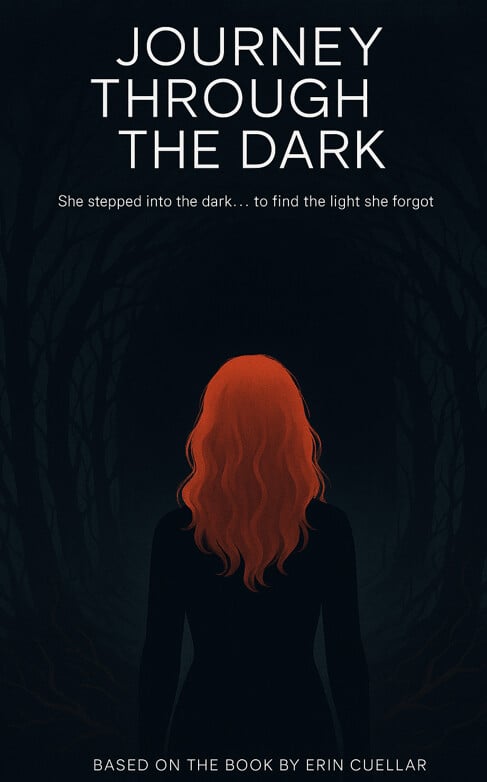Journey Through the Dark
Written by : Erin Cuellar
Erin Cuellar’s Journey Through the Dark is an evocative and deeply personal one-hour pilot that dares to merge psychological drama with fantasy and emotional realism. At its core, it is not just a story but a confrontation, a descent into the subconscious of a woman battling grief, trauma, and the quiet, dangerous pull of self-destruction.
The pilot, Episode 1: The Fall, introduces us to Beth, a grieving mother who awakens in a dream-realm that feels both hauntingly surreal and painfully familiar. This world, shaped by her fractured psyche, becomes the stage for a mythic odyssey where inner demons are not abstract but embodied forces, and childhood memories reemerge as both keys to survival and wounds that refuse to heal. The premise resonates with archetypal descent stories from Alice in Wonderland to Pan’s Labyrinth but Cuellar distinguishes her work by grounding the fantasy elements in raw emotional truth.
One of the most compelling aspects of Journey Through the Dark is the way it uses imagery and poetic narration to externalize inner pain. Rather than treating addiction, mental illness, and grief as background themes, Cuellar transforms them into the architecture of the narrative. The dream-realm operates as a metaphorical map of trauma, where fractured memory and surreal landscapes mirror the disjointed experience of living with loss and depression. This structural choice allows audiences to feel Beth’s turmoil, not just observe it.
Cuellar’s voice as a writer is strikingly vulnerable yet assured. The dialogue carries a lyrical weight, avoiding cliché while embracing a kind of poetic fragmentation that mirrors Beth’s psyche. Visual descriptions, too, are carefully chosen - haunting, vivid, and emotionally charged without being gratuitous. There is a cinematic quality that suggests a clear vision for how this series could manifest onscreen, balancing the intimacy of character-driven storytelling with the scale of fantastical world-building.
The script also excels in its thematic resonance. The battle between light and dark, self-destruction and survival, is presented not as a simple binary but as an ongoing negotiation - messy, painful, and deeply human. By introducing Beth’s “forgotten younger self” as both a character and a symbol, Cuellar provides a fresh and poignant way of exploring healing: not through external salvation, but through reconnection with one’s own fragmented identity.
While the dream-realm structure is powerful, it risks at times overwhelming the narrative clarity. There are moments where the poetic abstraction could blur the stakes or delay momentum for viewers who may crave a more grounded anchor in Beth’s waking reality. Finding a careful balance between surrealism and forward-driving narrative will be crucial for episodic storytelling, particularly in sustaining audience engagement across multiple episodes.


Additionally, Beth is immediately compelling, but secondary characters, whether manifestations of her psyche or figures from her real life, would benefit from further dimensionality early on. As the story grows, investing in the interplay between Beth and these figures will heighten both the emotional stakes and the dramatic tension.
Journey Through the Dark is a brave, haunting, and beautifully crafted script that dares to illuminate the landscapes of grief and survival in ways few series attempt. Erin Cuellar’s lived experience and literary voice infuses the work with authenticity and urgency, making it more than just a pilot, it feels like a call to those who have been to the edge and returned.
With refinement in balancing surrealism with narrative clarity, this pilot has the potential to evolve into a limited series that resonates deeply with audiences searching for stories that reflect the messy, nonlinear journey of healing.
A moving, poetic, and genre-bending pilot that transforms trauma into myth and despair into a battle for selfhood. Erin Cuellar’s Journey Through the Dark is both artful and cathartic, a script that lingers long after the final page.
Rating: ★★★★☆ (4.5/5)
